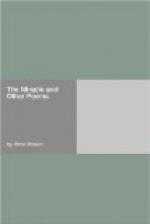And like a phantom ever at his side
Pointing each hour to paths he scarce
could see,
By wood and waterway, went one still guide,
Who drifted with the shades, when daylight
died,
Into the deep of night, and mystery.
But when they reached the place of many pines,
God’s country, that no white man
yet had named—
They beached their birch canoe ’neath swinging
vines,
For here, the Indian read by many signs,
Lay the wild land the tribe of Huron claimed.
Then like down-dropping pearls the rounded years,
One after one, slipped off the thread
of Time,
And Jean de Breboeuf laboured—oft with
fears
Safe-hidden, oftener still with smiles
and tears,
Among the people of this northern clime.
The forest children had become a part
Of his own life—always he
spoke their tongue,
He dwelt within their tents—with all his
heart
He learned their ancient woodcraft, and
each art
Their race had practised when the world was young.
He gave a simple truth and faithfulness
To men of silence and of subtle ways;
He shared with them long hunger and distress—
When they had little, he himself had less,
Through all the dark and lonely winter days.
High in the vast cathedral of the trees
He hung the bell of bronze; there in God’s
name
He taught the law of Love; there on his knees
In the sun-dappled gloom, midst birds
and bees,
He lifted up the cross, with words of name.
But evil days were come. The arrowhead
Was dipped in poison, and de Breboeuf
saw
The painted faces and the swift-slain dead,—
The deep, unhealing wound—the
rent of red
Made by the weapon of the Iroquois.
Closed in the village with its palisade,
Guarded by many a mighty Huron brave,
The women and the little children stayed,
Lest forest fire or sweeping midnight
raid
Make all their hunting ground a common grave.
It was at daybreak that they heard the cry:
“The Iroquois!—The Iroquois!
They come!
Fly to the hidden forest places! Fly!—
To linger in the village is to die—
Steal through the river grasses—and be
dumb!”
Swiftly the women and the children fled,
But with the braves de Breboeuf stayed
behind.
“Go!” cried the chief, “good father—we
be dead!”
Yet soft he answered as he shook his head:
“I stay with thee—and with thy old
and blind.”
When the red sun came creeping up the sky
Grey death had reaped the harvest hate
had sown;
The Jesuit heard no longer curse or sigh—
His prayers were said for those about
to die—
He faced the living Iroquois alone.
They bound him fast beneath the forest green,
And when was come the shadowy edge of
night—
Nay—ask not what the horned owl hath seen,
Nor what the moon doth know—white
and serene
The soul of Jean de Breboeuf took its flight.




